- Home
- Al Sarrantonio
Toybox Page 5
Toybox Read online
Page 5
All around Brenda and Harry there was a booming laugh. The Spook Man appeared.
His face was less indistinct now, yet still indescribable. He seemed less sinister, more of normal heights and painted in daytime colors.
“Two is more than I ever hope for,” he said, almost gently. He made a cape motion at the two fleeing figures outside, now climbing like quick monkeys over the fence and away. “They won't be scared for long. In time it will be almost a pleasant memory for them, a visit to a funhouse.”
He turned that elusive face on Brenda and Harry.
“Which is what this is—a funhouse—if you've the right stomach for it.” His voice became both echoes and hushed. “Town to town, and hardly ever more than one. Many times none at all.” His eyes, piercing, hooded, seemed to be searching for something in their faces, a beacon. They really don't know me, all the little people in these little towns. They're afraid of me and my little family. But they don't know.”
He leaned down over them, a midnight hawk looming over its brood or prey. “Little red and little black,” he continued, looking from Brenda to Harry. “Are you ready to join my family? You saw them, all the goblins and fiends and ghosts and demons there are. Once all of them looked just like you, little pink or yellow or ebony people with creature model kits and monster magazines. But something breathed inside them, behind the ghoul costumes and playthings, something locked in the crypts of their human bodies and straining to get out. They loved monsters so much they wanted to be monsters. I gave them the chance. I called them—never took them, only called—away from their creature features and werewolf masks and horror novels, and gave them the chance to join their real family. The one that would make their lives complete. Only the true ones stay, of course. Here they breathe with their real lungs and fly with their real wings, cocooning into the beautiful little horrors they want to be.”
He leaned even closer, his face becoming the shifting meadow of monstrous shapes, a nightmare triptych mirroring the life he offered. “So, little ones,” he said, his voice echoing all around them as his cape flowed out to encircle, hold them fast to his world, “are you ready to become my tiny son, my baby daughter? Do you want to see how much you really love monsters?”
“No!”
Harry pushed out at the cape, ducking under its strong black wings and out through the doorway. Soon his feet made the chainlink fence jangle as his sneakers carried him up, over, and gone.
The Spook Man laughed softly. “Hardly ever more than one,” he said, half to himself.
He turned slowly back to Brenda.
“And you, little crimson, have you made up your mind?” Brenda made no answer.
The Spook Man laughed a booming laugh then, and the doorway to the world zipped shut, and the brothers and sisters of the night came from their caskets and damp niches and dusty tombs to meet their new sibling, the creature of teeth and claws and wild red eyes that danced before them.
Other toys flew, fell, jumped from shelves and spilled out: a dollhouse bed a candy-filled cauldron, a rubber axe, a thing dry as tooth-grass and crackly as a drywood fire.
And: from far-off Christmas, a red glass ornament that roundly mirrored Selene’s face as she stared wide-eyed into it...
WISH
Christmas.
A baby-blanket of snow enfolded the earth, nuzzled the streets. Great lips of snow hung from gutters, caps of snow topped mailboxes and lampposts.
Christmas.
Dark green fir trees stood on corners, heavy with ornaments and blinking bulbs, dusted with silver tinsel that hung from each branch like angels' hair. Great thick round wreaths, fat red bows under their chins, hung flat against each door. Telephone poles sprouted gold stars; more lights, round fat and bright, were strung from pole to pole in parallel lines. The air, clean and cold as huffing breath, smelled of snow, was white and heavy and fat with snow.
Christmas.
Christmas was here.
It was April.
Daisy and Timothy hid tight in the cellar. Tied and dusty, April surrounded them in fly-specked seed packets, boxes of impotent tulip bulbs, rows of limp hoes and shovels. Spring was captured and caged, pushed flat into the ground and frozen over, coffined tight and dead.
Above them, out in the world, they heard the bells. A cold wind hissed past. The cellar window shadowed over as something slid past on the street.
Ching-ching-ching.
They held their breaths.
Ching-ching.
The window was unshadowed; the hiss and bells moved away.
The bells faded to a distant rustle.
They breathed.
Timothy shook out a sob.
“Don't you touch me!” he bellowed when his sister put a hand on his shoulder. “It's your fault! All the rest are in that place because of you—don't you touch me!” He pushed himself farther back between two boxes marked “Beach Toys.”
Outside, somewhere, a mechanical calliope began to play “Joy to the World.”
Winter silence hung between them until Timothy said, “I'm sorry.”
Daisy held her hand out to him, her eyes huge and lonely, haunted. He did nothing—but again when her fingers fell on his shoulder he recoiled.
“No! You wished it! It's your fault!”
Daisy hugged herself.
Timothy's face was taut with fright. “You said, `I wish it was Christmas always! I wish this moment would last forever!'“ He pointed an accusing hand at her. “I was there when you said it. By the fireplace, while we hung our stockings. I heard that voice too—but I didn't listen to it!” He pointed again. “Why did you have to wish?”
“I wish it was April! I wish it was spring!” Daisy screamed, standing up. An open carton of watermelon seeds, collected carefully by the two of them the previous summer, tilted and fell to the floor. Unborn watermelons scattered dryly everywhere. “It was just a voice, I don't know how it happened,” she sobbed. “I wish it was spring!”
Nothing happened.
Outside the frosted cellar window, the calliope finished “Joy to the World” and went without pause into “Silver Bells.”
“You wished it and now you can't unwish it!” Timothy railed. “That voice is gone and now it will always be Christmas!”
Daisy's face changed—she ignored his squirming protest when she :limped her hand to his arm.
“Listen!” she whispered fiercely.
“I won't! It's your fault!”
“Listen!”
Her wild, hopeful eyes made him listen.
He heard nothing for a moment. There was only Christmas winter out there—a far-off tinkly machine playing Supermarket carols, the sound of glass ornaments pinging gently against one another on outdoor tees and, somewhere distant, the sound of bells.
But then there was something else.
Warm.
High overhead.
Blue and yellow.
A bird.
Daisy and Timothy raced for the window. Daisy got there first, but Timothy muscled her away, using the pulled cuff of his flannel shirt to rub-melt the frost from a corner of the rectangular glass. He put his eye to the hole.
Listened.
Nothing; then—
Birdsong.
He looked back at his sister, who pulled him from his peephole and glued herself to it. After a moment
“I see it!”
Mountain-high overhead, a dark speck circled questioningly.
It was not a Christmas bird. It had nothing to do with Christmas. It was a spring bird, seeking April places—green tree branches and brown moist ground with fat red worms in it. A sun yellow and tart-sweet as lemons. Mown grass with wet odors squeezed out of each blade. Brown-orange baseball diamonds and fresh-blacktopped playfields smelling of tar.
The bird whistled.
“April!” Timothy shouted.
He pulled frantically at the latch to the window, turning it aside and pulling the glass panel back with a winter groan. Cold air bit in at
them. Snow brushed at their foreheads, danced and settled in their hair. Timothy climbed out.
High up, whirling like a ball on a string, the bird cried. “Yes! Yes! Spring!” Timothy yelled up at it.
Daisy climbed out beside him.
“You did it!” Timothy said happily. “You undid your wish!” The cellar window snapped shut.
Something small plummeted.
Frozen white and silver, the bird fell into a soft death-coverlet of snow.
“It was a trick!” Timothy screamed. “What are we going to do?” He turned to the locked window, tried frantically to push it in. When he opened his mouth, puffs of frosted air came out with his words.
“We've got to get away!”
Timothy and Daisy looked to the horizon. A huge red ball was there, a second sun, an ornament a hundred stories high, and from it came the faint jangle of bells, the smooth snow-brushed sound of sleigh runners.
“We'll be brought to that place—we've got to get away!”
The sleigh bells, the glassy sound of sled-packed snow, grew toward them. Before Daisy's hands could find Timothy, could pull him against the side of the house, he tore away from her. The bells rose to a hungry clang; Daisy could almost hear them sing with pleasure.
Timothy's fading voice called back:
“Why did you listen to that voice....”
The bells grew very loud and then very soft, and moved away.
Christmas continued. In the sky, a few hearty snowflakes pirouetted and dropped. Tinsel shimmered on tree branches. The air stayed clean and cold, newly winterized. Balsam scent tickled the nostrils. Christmas lights glowed, blinked.
From the horizon, from the giant red Christmas ball, came a sound.
Bells.
Soft silver bells.
“No!” Daisy's feet carried her from the side of the house to the white-covered sidewalk. She left tiny white feet in a path behind her.
The bells belled.
Daisy ran.
The lazy bells followed her. Like a ghost's smoky hands, they reached out at her only to melt away and re-form. Daisy passed snow-white houses, with angels in the windows and mistletoe under the eaves.
Daisy stopped.
The bells hesitated. There came a tentative ching, followed by silence and then another ching-ching.
Daisy ran, her yellow hair flying.
The houses disappeared, replaced by a row of stores with jolly front windows and Christmas-treed displays. Lights blinked. Above one store a plastic Santa drawn by plastic reindeer rose, landed, rose, landed.
Ching-ching.
The library budded into view. White-coated brick, its crystal windows were filled with cutouts of Christmas trees and holly. At the top of the steps, the doorway stood open.
Daisy climbed, entered.
Outside, the ghoul-bells chimed.
Ching-ching.
Ching-ching.
Ching.
She heard the smooth stop of sleigh-skis in the snow.
The library door loomed wide.
Someone stepped into it.
“Daisy?” a voice called coldly. It was a voice she knew.
“Daisy?”it spoke again. Icicles formed in the corners; snow sprinkled down from the ceiling. It was the voice that had spoken to her.
Daisy pushed past the empty librarian's desk, knocked over the silver Christmas tree on the counter. She dove under the tasseled red rope into the children's section. Bright book covers glared at her. Babar the elephant walked a tightrope, the bulb-like faces of Dr. Seuss characters grinned, Huckleberry Finn showed off his inviting raft to his hulking friend Jim. “I wish I could be with them,” Daisy thought; but nothing happened.
Behind her, the voice, closer, called again in chilly sing-song:
“Daisy, Daisy, it's Christmas always!”
“No!” Daisy hissed to herself fiercely. She crawled under one stack of books that had been left to spill against a bookcase, making an arch. Behind it were more books—Hardy Boys and Nancy Drews, two Treasure Islands, one Robinson Crusoe tilted at an angle. Behind them a pile of National Geographic magazines, with color covers.
Daisy burrowed her way into the magazines, covered herself with books and periodicals, made a fort of the Hardy Boys with a fortress gate made of The Wind in the Willows.
Steps clacked closer against the polished oak floor.
“Where are you?” the cold voice sang.
“Christmas all the time!
“Always Christmas!
“Daisy . . .”
The footsteps ceased.
The Hardy Boys were lifted away.
“Daisy...”
A hard hand reached down to fall on her. She felt how death-cold he was. His suit was red ice; he wore a red cap at a jaunty angle.
His face was white, his ice-blue eyes were arctic circles filled with swirling frost.
“I wish it was spring! I wish it was April!”
“Christmas always,” he said, smiling a sharp blue smile.
“I wish I could kill you!”
With her two small hands Daisy threw The Wind in the Willows up at him. A corner of the book hit his cold, smoky eye and he staggered back.
Miraculously, amazingly, he fell. There was a shatter like an icicle hitting the sidewalk. There was the ching of a million tiny bells. He lay silent.
He lay...dead.
Daisy got up to see a dying blizzard blowing in his eyes. A cold blue hand lifted momentarily, reached towards her—and fell back, cracking up and down its length.
He dripped melting water.
Daisy breathed.
Outside, a bird sang.
Daisy crawled under the book arch, under the red tassel. She ran past the empty desk, the fallen silver tree, out the yawning door.
The sky was growing blue. A squirrel ran past. A blackbird dipped low, squawked and didn't fall.
It was April.
Spring.
Christmas was leaving the world.
Balsam scent grew sour and stale. The snow grew old-gray and slushy. Winter was old; the house lights, round wreaths, tinsel grew dim and left-out-too-long. In the middle of “Have Yourself a Merry—” the calliope ground to a halt.
At the horizon, the huge red ball was less shiny-bright.
His sleigh stood in front of the library. It was ice-white and red, lined with ice bells, pulled by ice reindeer. It shivered as Daisy climbed into it and snapped the reins.
“Take me to them,” she said.
The sleigh shuddered into melting life.
Spring was exploding around her. They went over miles of white earth turning to green. The air was warm as hay. Fish leaped in blue-clear ponds, orange-yellow flowers burst from the ground, leaves generated spontaneously. Daisy wondered if, back in her cellar, watermelons were sprouting everywhere and hoes and shovels were dancing up the stairs to reach the loamy soil.
Beneath Daisy, the ice sleigh dripped into the ground. The soil drank it up—bells, reindeer and all. Daisy leaped from the last puddle of it, new green grass like springs pushing at her feet.
Over a short hill, touching the spring sky—and there was the red ball.
It was a blown-glass Christmas bulb halfway up the sky. Its glossy crimson was tarnishing. Winter rushed out the tiny door at the bottom, howling, eaten alive by spring. Daisy hugged herself as it blew past.
The dying snowstorm engulfed her, pulled her inside.
She sobbed at what was there.
The ball was filled with frozen Christmas. A Nutcracker Christmas tree, with a thousand presents underneath, filled the center of the orb. Its branches sagged. Lights were everywhere, winking out. And lining the walls all the way to the top, were frozen people keeping frozen Christmas.
A spidery white stairway wound up and around, and Daisy stepped onto it. There was the snap of melting ice. She looked in at each block, wiping warm tears of water away with her fingers. In one there was a man with a beard she knew who watered his lawn in the summer e
ach Saturday, even if it rained. His beard was frozen now He knelt before a Christmas tree, fitting it into its stand. There was a boy who delivered newspapers, caught removing a model airplane from its Christmas wrap. A woman was ice in her rocking chair, a mince pie cradled in her potholdered hands—the pie looked good enough to eat. A little girl made garlands out of popcorn. A mother and daughter exchanged Christmas cards.
At the end of the winding stair, at the very top, was
Timothy.
Daisy gasped. Timothy stared out at her like wax. In his hand he held a limp, flat stocking; he bent to tack it to a rich-oiled mantel above a fireplace. A log fire burned snugly in the grate.
The ice shimmered and softened; Timothy moved.
Beside him, there was an empty space.
As Daisy reached out, the ice hardened again.
“Can't...unwish . . .,” Timothy said before his mouth froze closed. Outside, she heard the bells.
Winter came rushing back. The air glinted like clear cold crystal. The tarnished ball grew metal-shiny. On the Christmas tree, limp pine boughs stiffened, grew tall. Nearby, in the walls, in the air, the calliope played “God Rest Ye Merry, Gentlemen.”
Ching-ching.
The sleigh moved over the snow with a sound like wishhhhhhh.
Ching.
Daisy looked up, and in the red metal glass above her, someone was reflected from far below.
Someone tall and white, with red-ice coat, blue-ice eyes, black-ice boots.
“Ice is water,” he explained, in his voice; “water makes ice.”
“I wished you were dead!” Daisy screamed.
He put his boot on the stair.
He climbed.
He stood before her.
As he finally put his cold hand on her; as she felt Christmas brighten and stiffen around her; as she felt the red velvet stocking caress her hands, and smelled the wood smoke from the fireplace, and felt Timothy's hand on her arm, telling her not to listen; as ice filled around her and hardened and froze her forever, she heard whispered close by, in a voice she now knew might have been any of a thousand cold or hot voices, a voice that might become any of a thousand cold or hot things, a laughing voice, a voice that was ancient, persistent and patient in its longing for release, “Make a wish.”

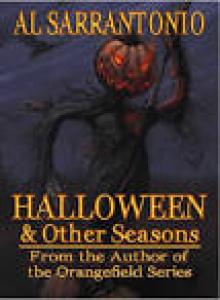 Five World Saga 01 Hornets and Others
Five World Saga 01 Hornets and Others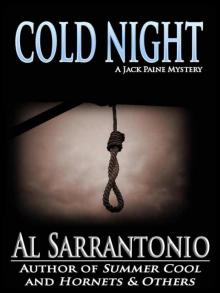 Cold Night (Jack Paine Mysteries)
Cold Night (Jack Paine Mysteries)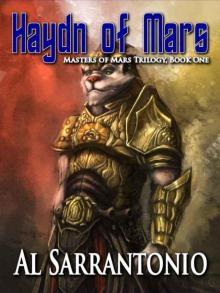 Haydn of Mars
Haydn of Mars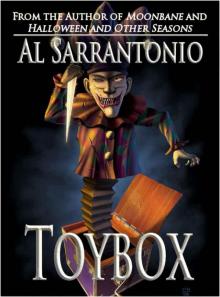 Toybox
Toybox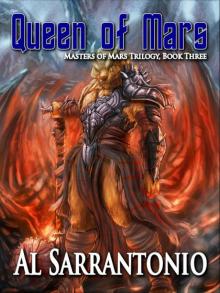 Queen of Mars - Book III in the Masters of Mars Trilogy
Queen of Mars - Book III in the Masters of Mars Trilogy Exile
Exile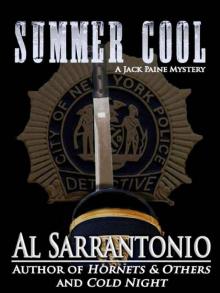 Summer Cool - A Jack Paine Mystery (Jack Paine Mysteries)
Summer Cool - A Jack Paine Mystery (Jack Paine Mysteries)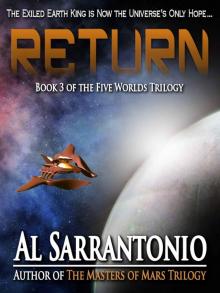 Return - Book III of the Five Worlds Trilogy
Return - Book III of the Five Worlds Trilogy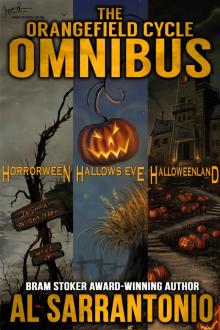 The Orangefield Cycle Omnibus
The Orangefield Cycle Omnibus Summer Cool jp-2
Summer Cool jp-2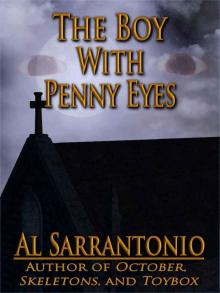 The Boy With Penny Eyes
The Boy With Penny Eyes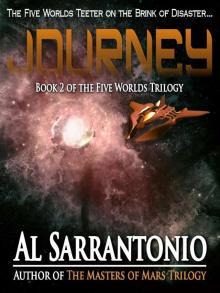 Journey - Book II of the Five Worlds Trilogy
Journey - Book II of the Five Worlds Trilogy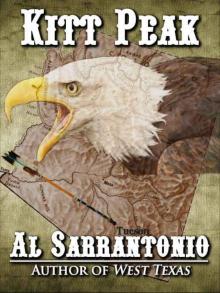 Kitt Peak
Kitt Peak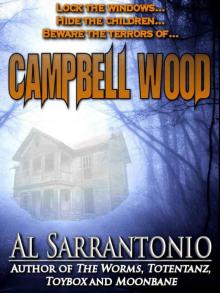 Campbell Wood
Campbell Wood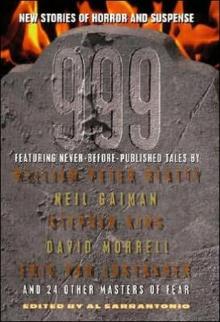 999
999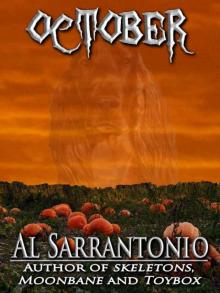 October
October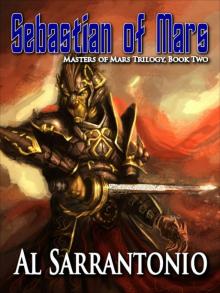 Sebastian of Mars
Sebastian of Mars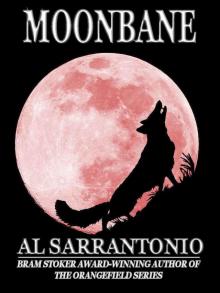 Moonbane
Moonbane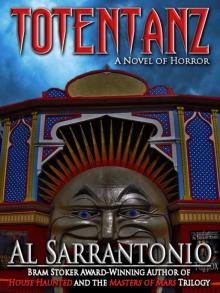 Totentanz
Totentanz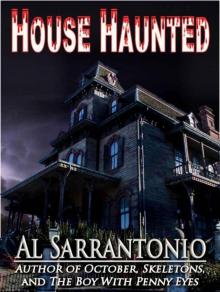 House Haunted
House Haunted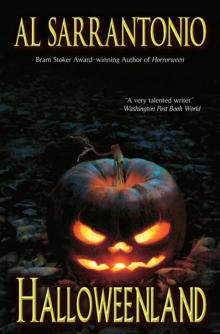 Halloweenland
Halloweenland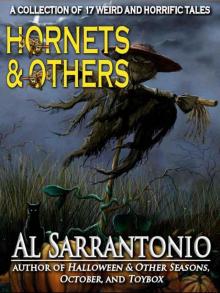 Hornets and Others
Hornets and Others